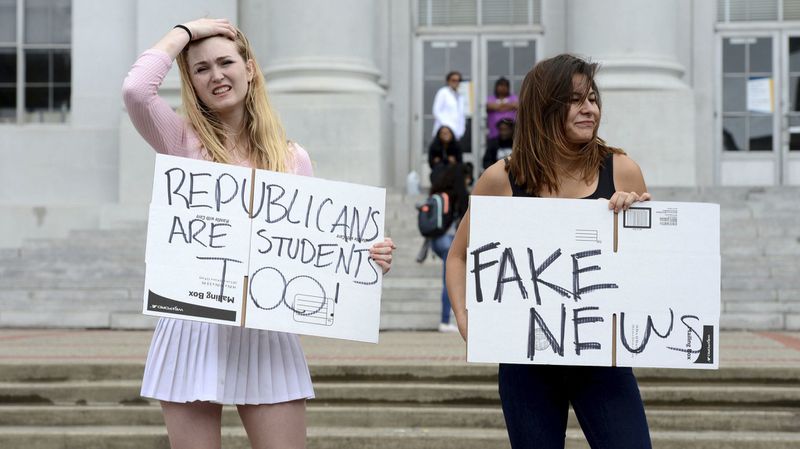Oct. 21, 2019
COLLEGE PARK, Md.—2016 was an awkward year for Talia Shemony.
Then a sophomore at Charles E. Smith Jewish Day School in Rockville, Maryland, Shemony was already knee-deep in traditional high school fare: tests, college prep, friends. But she also carried a secret that isolated her from even her closest friends — one that she did not tell a single person until after Nov. 8, 2016.
She was supporting Donald Trump in his candidacy for president.
Fearing what her friends at school would say, Shemony kept quiet about her feelings until after the election, and still struggled to tell them the truth after the fact.
When she talks about her ideologies, however, Shemony slowly becomes louder and more confident as she explains herself. She believes in gay marriage. She staunchly defends the Second Amendment. She does not endorse abortion personally, but she believes it’s not the government’s place to determine if a woman can have one.
She knew she was in the political minority almost everywhere she went: school, her hometown, her county. Even in Maryland, a state with a Republican governor, Republicans are only 31.6% of the voting population where Democrats outnumber her party 2-to-1, according to the state Board of Elections. The political skew in Shemony’s home county is even more obvious, where only 17.7% of voters in 2018 identified as Republicans or Libertarians.
Now a freshman at the University of Maryland in College Park, Shemony is still cautious about sharing her political views with new friends and in classes for fear of being exiled or insulted. And even two years removed from President Trump’s inauguration, her hesitations have not improved.
“Ever since Trump got elected, I’ve been more afraid to say the things that I believe in,” Shemony said. “So, it’s definitely not something I broadcast especially when you come to college, you want to make a lot of new friends. You don’t want to draw people off because of that … When you come on and you’re a Republican or a conservative and talk about Trump, people just write you off and don’t want to be friends with you.”
While Shemony joined her university’s College Republicans chapter and became vice president of her chapter of Turning Point USA, a conservative nonprofit group on college campuses, and has even found herself making friends that do not share her ideals, she still gets nervous about voicing her political views — even fiddling with her jacket zipper when she talks about awkward situations. She said that she has been insulted by random strangers in classes who she has just met and have not gotten the chance to know her at all before they attack her.
“I told someone that I was a Trump supporter and they said ‘Oh, so you’re a homophobe,’” she said, recalling the experience. “Ever since Trump’s been elected … I’ve felt like I have to have my speech restricted because people are going to call me a racist.”
Shemony is not alone: Young conservatives and conservative action groups across the country have echoed her sentiments. Many young people say they feel drowned out in a sea of Democratic voices on liberal campuses.
In March, Trump took action to address those complaints, issuing an executive order with the title, “Improving free inquiry, transparency, and accountability at colleges and universities.” The order mandates that institutions of higher education receiving federal funding have to be supportive of free speech on their campuses and that they “avoid creating environments that stifle competing perspectives, thereby potentially impeding beneficial research and undermining learning.”
While the order does not explain how free speech will be enforced, Shemony said the step was a positive moment for her and students who do not feel safe or even acknowledged when expressing their viewpoints.
“Free speech is one of the most important things you can have,” she said. “Hearing something like that from President Trump, I thought that was was extremely important as someone who’s been kind of drowned out with their views … it’s at least recognized on national scale that this is a problem that needs to be fixed on college campuses.”
Conservative students are not the only people at colleges and universities to notice the sway. Professors are often aware of the skew that their students face, especially when politics come up in the classroom often. Martin Kobren, a professor at the University of Maryland who co-instructs a class on First Amendment rights, knows that his students are mostly left-leaning, but he says he tries to counteract that by making sure that every student has the chance to be heard.
“It’s very possible [that conservative students are being drowned out],” Kobren said. “You can’t miss the fact that we have a very highly polarized society in which we’re defining ourselves by our political groups. It’s natural for people to press their advantage when they're in the majority.”
Shemony, though, combats being the minority by trying to civilly debate and discuss politics with people in class whenever her views are challenged.
“People should know that we, [young conservatives], do exist,” she said. “We’re here and we’re very willing and open to speak to anybody.”
